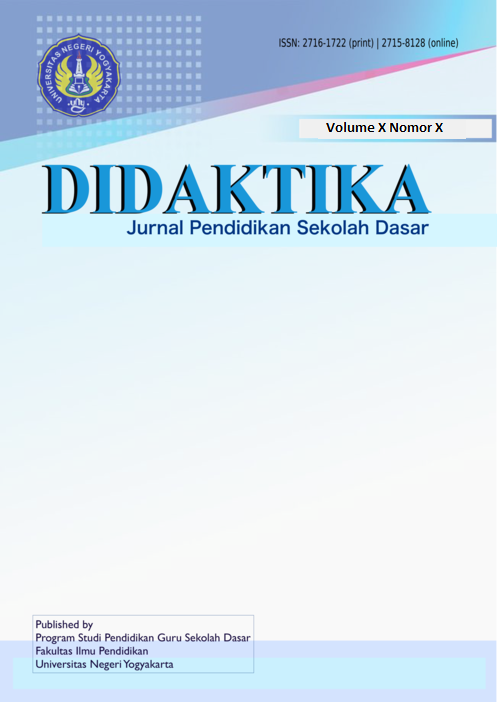Perbandingan Pengaruh Berbagai Jenis Model Pembelajaran Terhadap Keterampilan Proses Sains Mahasiswa Calon Guru Sekolah Dasar
DOI:
https://doi.org/10.21831/didaktika.v3i2.35339Abstract
The aim of this research was to compare the influence of learning models on the science process skills of pre-service elementary school teacher. Research method was a quasi-experimental with The Matching Only Design.. The research population was all 5th semester students of pre-service elementary school teachers with a total population of 350 students. The sample was class 5E, 5G and 5H selected by Cluster Random Sampling.. The instrument was science process skills test. The data was analyzed using the Median test. The results showed that there was a significant difference in science process skills between Inquiry Learning, Problem Based Learning and Discovery Learning.References
Ambross, J., Meiring, L., & Blignaut, S. (2014). The implementation and development of science process skills in the natural sciences : A case study of teachers ' perceptions, (February 2015), 37–41. https://doi.org/10.1080/18146627.2014.934998
Ayadiya, N., & Sumarni, W. (2015). The Application of Discovery Learning With Scientific Approach to Improve The Students ' Science Process Skill. In Proceedings of Joint Conference on Chemistry FSM, Diponegoro University (pp. 466–469).
Dewi, S. R., Nurmilawati, M., & Budiretnani, D. A. (2017). Improving of scientific literacy ability using discovery learning model at the seventh grade students of state JHS 3 Ngronggot, Nganjuk-Indonesia. Jurnal Pendidikan Biologi Indonesia, 3(3), 266. https://doi.org/10.22219/jpbi.v3i3.4597
Fraenkell, J. R., & Wallen, N. E. (2007). How to Design and Evaluate Research in Education (Seventh Ed). New York: Mc. Graw-Hill Higher Education.
Indrawati. (2000). Keterampilan Proses Sains: Tinjauan Kritis dari Teori ke Praktis. Bandung: Depdikbud Dirjen Pendidikan Dasar dan Menengah Pusat Pengembangan Penataran Guru Ilmu Pengetahuan Alam.
Jiwanto, I. N., Sugianto, & Khumaedi. (2017). PENGARUH IMPLEMENTASI MODEL PEMBELAJARAN INKUIRI TERBIMBING KOOPERATIF JIGSAW TERHADAP KETERAMPILAN PROSES SAINS SISWA SMP. JIPVA (JURNAL PENDIDIKAN IPA VETERAN), 1, 1–8.
Koksal, E. A., & Berberoglu, G. (2014). The Effect of Guided-Inquiry Instruction on 6th Grade Turkish Students ' Achievement , Science Process Skills , and Attitudes Toward Science. International Journal of Science Education, 36(November 2014), 66–78. https://doi.org/10.1080/09500693.2012.721942
Lati, W., Supasorn, S., & Promarak, V. (2012). Enhancement of Learning Achievement and Integrated Science Process Skills Using Science Inquiry Learning Activities of Chemical Reaction Rates. Procedia - Social and Behavioral Sciences, 46, 4471–4475. https://doi.org/10.1016/j.sbspro.2012.06.279
Molefe, L., & Stears, M. (2014). Rhetoric and Reality : Science Teacher Educators ' Views and Practice Regarding Science Process Skills. African Journal of Research in Mathematics , Science and Technology Education, 18(December 2014), 37–41. https://doi.org/10.1080/10288457.2014.942961
Musfiqon, H., & Nurdyansyah. (2015). Pendekatan Pembelajaran Saintifik (Nizamia Le). Sidoarjo.
í–zgelen, S. (2012). Students ' Science Process Skills within a Cognitive Domain Framework. Eurasia Journal of Mathematics, Science & Technology Education, 8(4), 283–292. https://doi.org/10.12973/eurasia.2012.846a
Pardede, E., Motlan, & Suyanti, R. D. (2016). Efek Model Pembelajaran Guided Discovery Berbasis Kolaborasi Dengan Media Flash Terhadap Keterampilan Proses Sains Dan Hasil Belajar Kognitif Tinggi Fisika Siswa Sma. Jurnal Pendidikan Fisika, 5(1), 12–17.
Rustaman, N. Y., Dirdjosoemarto, S., Yudianto, S. A., Achmad, Y., Subekti, R., Rochintaniawati, D., & K., M. N. (2003). Strategi Belajar Mengajar Biologi. Jurusan Biologi FPMIPA UPI.
Sagala, N. L., Rahmatsyah, & Simanjuntak, M. P. (2017). The Influence of Problem Based Learning Model on Scientific Process Skill and Problem Solving Ability of Student. IOSR Journal of Research & Method in Education (IOSR-JRME), 7(4), 1–9. https://doi.org/10.9790/7388-0704040109
Sari, P. M., & Zulfadewina. (2018). Profile of Science Process Skill Mastery from Pre-service Elementary School Teacher. Jurnal Inovasi Pendidikan Dasar, 3(2), 65–72. https://doi.org/10.1021/acs.cgd.5b00135
ÅžimÅŸek, P., & Kabapinar, F. (2010). The effects of inquiry-based learning on elementary students' conceptual understanding of matter, scientific process skills and science attitudes. Procedia - Social and Behavioral Sciences, 2(2), 1190–1194. https://doi.org/10.1016/j.sbspro.2010.03.170
TaÅŸoǧlu, A. K., & Bakaí§, M. (2010). The effects of problem based learning and traditional teaching methods on students' academic achievements, conceptual developments and scientific process skills according to their graduated high school types. Procedia - Social and Behavioral Sciences, 2(2), 2409–2413. https://doi.org/10.1016/j.sbspro.2010.03.346
Tatar, E., & Mí¼nir Oktay. (2011). The effectiveness of problem-based learning on teaching the first law of thermodynamics. Research in Science & Technological Education, 29(3). https://doi.org/https://doi.org/10.1080/02635143.2011.599318
Downloads
Published
How to Cite
Issue
Section
License
- Authors retain copyright and grant the journal right of first publication with the work simultaneously licensed under a Creative Commons Attribution License that allows others to share the work with an acknowledgement of the work's authorship and initial publication in this journal.
- Authors are able to enter into separate, additional contractual arrangements for the non-exclusive distribution of the journal's published version of the work (e.g., post it to an institutional repository or publish it in a book), with an acknowledgement of its initial publication in this journal.
- Authors are permitted and encouraged to post their work online (e.g., in institutional repositories or on their website) prior to and during the submission process, as it can lead to productive exchanges, as well as earlier and greater citation of published work.






